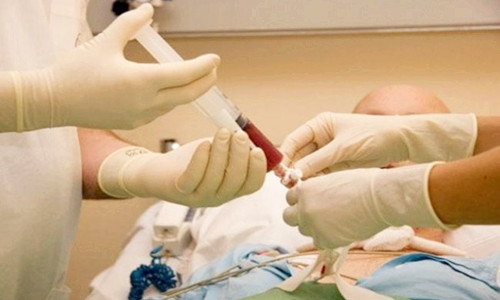Novartis granted US FDA Priority Review for Kymriah(TM) (tisagenlecleucel), formerly CTL019, for adults with r/r DLBCL
January 18, 2018
Source: Novartis
 359
359

Novartis today announced that its supplemental Biologics License Application (sBLA) for KymriahTM (tisagenlecleucel) suspension for intravenous infusion, formerly CTL019, for the treatment of adult patients with relapsed or refractory (r/r) diffuse large B-cell lymphoma (DLBCL) who are ineligible for or relapse after autologous stem cell transplant (ASCT) has been accepted by the US Food and Drug Administration (FDA) for Priority Review. In addition, the European Medicines Agency (EMA) has granted accelerated assessment to the Marketing Authorization Application (MAA) for Kymriah for the treatment of children and young adults with r/r B-cell acute lymphoblastic leukemia (ALL) and for adult patients with r/r DLBCL who are ineligible for ASCT. Priority Review and accelerated assessment are granted to therapies which may provide a significant improvement in the safety and effectiveness of the treatment of a serious disease, and the designations are intended to expedite the standard review time. If approved by the FDA and EMA, Kymriah would represent the first chimeric antigen receptor T cell (CAR-T) therapy available for two distinct indications in non-Hodgkin lymphoma and B-cell ALL.
Kymriah became the first CAR-T cell therapy to receive regulatory approval when it was approved by the FDA in August 2017 for the treatment of patients up to 25 years of age with B-cell precursor ALL that is refractory or in second or later relapse.
"The first approval of a CAR-T therapy truly redefined the future of the cancer treatment landscape, and we are only at the beginning of this new era in cancer care," said Samit Hirawat, MD, Head, Novartis Oncology Global Drug Development. "The Priority Review designation and accelerated assessment signal that the FDA and EMA have recognized the potential of Kymriah to provide a much-needed therapeutic option for these patients with relapsed or refractory B-cell ALL and DLBCL. We are now focused on working with these regulatory agencies to bring this potentially transformative therapy to more patients."
Kymriah is a novel immunocellular therapy and a one-time treatment that uses a patient's own T cells to fight cancer. Kymriah uses the 4-1BB costimulatory domain in its chimeric antigen receptor to enhance cellular expansion and persistence. In 2012, Novartis and the University of Pennsylvania (Penn) entered into a global collaboration to further research, develop and commercialize CAR-T cell therapies, including Kymriah, for the investigational treatment of cancers.
The regulatory applications in the US and EU are based on data from the Novartis-sponsored global clinical trial program of Kymriah in children and young adults with r/r B-cell ALL and adult patients with r/r DLBCL demonstrating the efficacy and safety of Kymriah across studies. Results from the pivotal phase II JULIET clinical trial served as the basis of the sBLA and MAA (applications submitted by pharmaceutical companies to health authorities when seeking approval of a new product) for Kymriah in adult patients with r/r DLCBL. Results from the pivotal phase II ELIANA study were submitted as part of the MAA for Kymriah in children and young adults with r/r B-cell ALL.
JULIET is the first multi-center global registration study for Kymriah in adult patients with r/r DLBCL. JULIET is the largest study examining a CAR-T therapy in DLBCL, enrolling patients from 27 sites in 10 countries across the US, Canada, Australia, Japan and Europe, including: Austria, France, Germany, Italy, Norway and the Netherlands. Data from the six-month primary analysis of JULIET were presented at the annual meeting of the American Society of Hematology (ASH) in December 2017.
ELIANA is the first pediatric global CAR-T cell therapy registration trial, examining patients in 25 centers in the US, Canada, Australia, Japan and the EU, including: Austria, Belgium, France, Germany, Italy Norway, and Spain.
Novartis plans additional regulatory submissions for Kymriah in pediatric and young adult patients with r/r B-cell ALL and adult patients with r/r DLBCL beyond the US and EU in 2018.
About CAR-T
CAR-T is different from typical small molecule or biologic therapies because it is manufactured for each individual patient using their own cells. During the treatment process, T cells are drawn from a patient's blood and reprogrammed in the laboratory to create T cells that are genetically coded to recognize and fight the patient's cancer cells and other B cells expressing a particular antigen.
By Ddu
Read more on
- Breakthrough Device Designation Granted to Digital Intervention for Alzheimer’s August 27, 2018
- FDA Approved Eye Drop Oxervate to Treat Neurotrophic Keratitis August 27, 2018
- Experimental Ebola Treatments Approved by Congo as it Sees Flare-Up in Cases August 24, 2018
- First Dual-Lead Nerve Stimulator for Pain Management gets FDA Nod August 22, 2018
- Bristol-Myers Squibb’s Opdivo Ensures a Lung Cancer Position August 22, 2018
your submission has already been received.
OK
Subscribe
Please enter a valid Email address!
Submit
The most relevant industry news & insight will be sent to you every two weeks.



